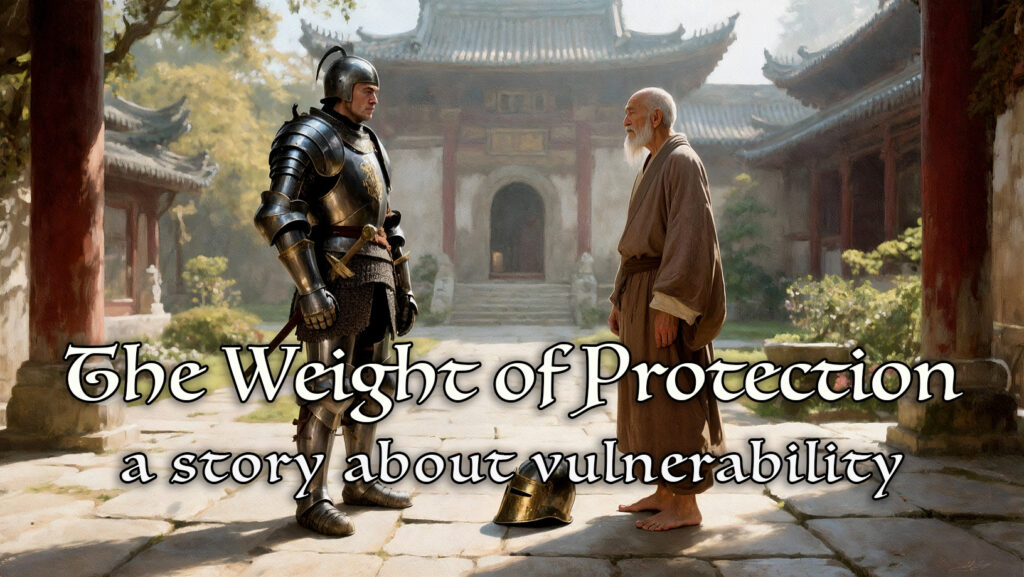The Weight of Protection

The knight dismounted in the courtyard, his plate armor catching the afternoon sun like a mirror. Each movement announced itself with the clang of metal on metal. He had traveled far to reach this monastery, driven by tales of warriors who fought without protection.
An old master emerged from the garden, wearing only simple robes. His feet were bare against the stone.
“You are the one they speak of?” The knight’s voice echoed within his helm. “The warrior who wears no armor?”
The master bowed slightly. “I am simply a student of movement. You have come a long way. Your armor must be heavy.”
“Heavy? It is the finest plate in Christendom!” The knight rapped his knuckles against his breastplate. “Forged in layers, proof against sword and arrow. A man in such armor is invincible.”
“May I ask,” the master said gently, “what does it protect you from?”
“From blades, of course. From spears and axes. From any weapon that would pierce the flesh.”
The master nodded thoughtfully. “Your armor protects against the sword, yes. But tell me – does it protect you from the cold?”
“I wear padding beneath—”
“From heat?”
The knight was indeed sweating in the afternoon sun. “Well, no, but—”
“From drowning? From fire? From poison? From hunger or thirst? From fear?”
Each question landed like a stone in still water. The knight felt a strange discomfort that had nothing to do with the weight on his shoulders.
“These are not the threats a warrior faces in battle,” he said, but his voice had lost its certainty.
“Are they not?” The master’s eyes were kind. “I have known many warriors. They rarely die from the things their armor protects against. But from exhaustion beneath its weight. From drowning when unhorsed at a river. From heatstroke on long marches. From infections in the places where metal rubs flesh raw. The armor protects them from one kind of death while delivering them to another.”
The knight was silent.
“And tell me,” the master continued, “when you wear this armor, can you feel the rain? Can you embrace your child? Can you know if a man approaching behind you is friend or foe by the sound of his breath?”
“Why would I need to—”
“Because protection that separates you from the world also separates you from life itself. Your armor makes you so afraid of one kind of harm that you accept a thousand other limitations.”
“And you?” The knight’s voice rose. “You stand there in cloth and skin, and claim to be better protected? A single arrow would end you!”
“Perhaps,” the master said. “If I could not see it coming. If I had not learned to move. If I stood rigid and proud, believing myself invincible.” He paused. “Your armor protects against the attack you expect, from the direction you anticipate, in the form you recognize. But life does not attack so predictably. Pain finds the gaps between the plates. Loss seeps through the joints. Grief, loneliness, shame – they slip beneath the armor while you stand confident in your protection.”
“Then what would you have me do? Stand naked before my enemies?”
“No.” The master shook his head. “I would have you learn to move. When you train the body, when you cultivate awareness, when you practice until response becomes as natural as breath – then you need no armor. You do not block the sword; you are not there when it falls. You do not resist the attack; you redirect it. You do not harden against pain; you feel it, understand it, and let it pass through you without taking root.”
“That is impossible. Pain is pain.”
“Is it? Watch.” The master extended his bare arm. “Strike me. With the flat of your blade.”
Reluctantly, the knight tapped the master’s forearm with the flat of his sword – a blow that would have bruised badly.
The master’s arm simply wasn’t there anymore. It had moved just enough, just in time, flowing around the strike like water around a stone.
“You see?” the master said softly. “I am vulnerable, yes. I can be cut. But I am also free to move, to adapt, to respond. Your armor makes you strong against one kind of harm. My practice makes me flexible against many kinds. You are hard where I am soft. But hardness is also brittleness. And softness can be strength.”
The knight looked down at his armor – really looked at it. At the weight that had become so familiar he no longer noticed it.
“The armor,” he said slowly, “it is not just metal, is it?”
The master smiled. “No. We all wear armor. Some are just more honest about it than others. Some are made of metal and some of pride. Some of anger, some of indifference. Some people armor themselves in constant work, some in drink, some in being needed by everyone so they never have to face what they need themselves.”
“And you wear none of this?”
“I did not say that. I said I practice. Every day, I practice feeling what is real, even when it hurts. Especially when it hurts. I practice staying present when I want to flee. I practice softness when I want to harden. It is the hardest work I have ever done.” He paused. “But I do not carry it on my shoulders.”
The knight looked down at his armor – really looked at it. At the scratches and dents that told the story of his fears. At the weight that had become so familiar he no longer noticed it. At the barrier between himself and everything he claimed to protect.
“Can it be removed?” he asked quietly. “After so long?”
“Oh yes,” the master said. “Piece by piece. And each piece removed, you will feel lighter. More vulnerable, yes. More able to be hurt. But also more able to feel joy, connection, love. More able to move through this life instead of being rigid within it.”
“And if I am attacked while unarmored?”
“Then you will learn to not be where the attack lands. Or you will be hurt, and you will heal, and you will be stronger for it – truly stronger, not just better defended. The wound that is felt and tended heals clean. The wound that armor hides festers beneath the plate.”
The knight was quiet for a long time. Finally, he reached up and removed his helm. The air on his face felt like a blessing.
“Will you teach me?” he asked.
The master bowed. “I will teach you what I know: that the opposite of vulnerability is not safety. It is isolation. And the opposite of protection is not harm. It is presence.”
“That sounds terrifying.”
“Yes,” the master agreed, smiling. “And also like freedom. Come. We begin with very small movements. And with learning to fall.”
The knight set his helm on the ground.
“I have been falling for years,” he said. “I just did it in armor so no one could see.”
“Then you already know something important,” the master replied. “Now you will learn to fall on purpose. To choose the vulnerability instead of having it forced upon you. To be soft enough to bend instead of hard enough to break.”
